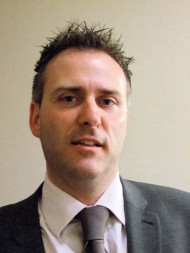 The KNAPP Group, a leading logistics solutions provider, is famous for its innovative universal shuttle storage and error-free warehouse concepts, which have transformed the materials handling processes in busy warehouses around the world. Its international lead has strengthened in the two years since April 2008, when David James took over as MD of its UK operation from Mike Cogger, who founded the UK business in 1997.
The KNAPP Group, a leading logistics solutions provider, is famous for its innovative universal shuttle storage and error-free warehouse concepts, which have transformed the materials handling processes in busy warehouses around the world. Its international lead has strengthened in the two years since April 2008, when David James took over as MD of its UK operation from Mike Cogger, who founded the UK business in 1997.
During this time, KNAPP’s parent company KNAPP AG has been enhancing its position through acquisitions. The first was in June 2008, when it bought the Swedish logistics firm Moving AB, which strengthened KNAPP’s presence in Scandinavia. Then in June 2010 KNAPP bought Dürkopp Fördertechnik GmbH, enabling KNAPP to supply comprehensive warehouse automation solutions to clients in the fashion industry. The KNAPP Group has enjoyed a prosperous business year in 2009-10, with sales revenue of 204.6 million Euros and increased its market share and now, following the Dürkopp purchase, KNAPP’s management predicts turnover to increase by 15% in 2010/11, instead of the previous forecast of 5-10%.
Here in the UK, KNAPP also offers a wide range of added-value services for its customers’ materials handling installations and has resident maintenance contracts with four key clients – John Lewis, British Gas, Clarks and The Co-operative Pharmacy. Further strengthening its sales and service proposition, KNAPP has recently made a number of key appointments at its UK headquarters, including Ebb Kretschmer as Head of Customer Service, Steve Knights as Business Development Manager for Integrated Projects and Craig Rollason as Head of Sales & Marketing. Craig Rollason spoke to Warehouse & Logistics News.
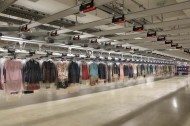 Warehouse & Logistics News – First of all, Craig, what does your role involve from day to day?
Warehouse & Logistics News – First of all, Craig, what does your role involve from day to day?
I head up sales for the UK and look after the marketing aspects, including business development activities, for both ongoing business and potential new customers, and segmented targeting in certain sectors, particularly retail food and non-food, and pharmaceutical.
WLN – Are you personally involved in developing solutions for customers?
Yes, I am, depending on their size and nature. The UK team is fully involved in system design and project management, supported by people from our head office in Austria.
WLN – How would you sum up the KNAPP UK proposition?
We design, produce and deliver logistics solutions for order fulfilment including picking and packing, storage, conveyor transport and general material handling. We have extensive expertise in order picking and focus on integrated logistics concepts, from small modifications to highly integrated, complex solutions.
WLN – Which industry sectors are your target markets?
We cover pharmaceuticals, retail food/non-food, fashion, e-commerce fulfilment and spare parts. Our spare parts activity can cover a wide range of solutions from kitting operations to full-scale distribution, but our solutions can fully interlink with large production lines and we would definitely look at systems supplying components to them. Tobacco is also a live and blooming part of the business, with specific machinery for dispensing cigarette cartons. Cosmetics is another major area, with Avon probably our biggest global customer. Here in the UK, we supply their distribution centre.
WLN – What specific items of kit do you make?
We supply everything from the low level software upwards, including machine control up to warehouse management and control systems and host level interfacing. We supply conveyors and storage solutions, in particular OSR Shuttle™ order storage and retrieval; A-frame auto dispensers; and pick-to-light, RF and voice-directed picking systems.
WLN – What size of operations are they designed for?
Our kit encompasses operations from small projects costing less than €100,000 to large projects worth in excess of €40m.
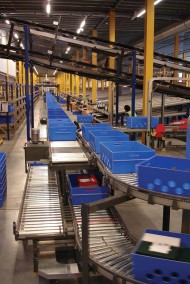 WLN – Is the Dürkopp operation now fully integrated into KNAPP?
WLN – Is the Dürkopp operation now fully integrated into KNAPP?
Yes, it is. The Dürkopp business is carrying on as before and will keep its own brand name, but is now a central part of our group and will expand.
Dürkopp is a hanging garment solutions provider, and complements what we do. Fashion is a key area, so it’s a good fit. We now offer a totally integrated solution for boxed and hanging garments – a one-stop shop. From a software point of view, we now offer customers better integration and fewer different interfaces in their business. For example, boxed and hanging garment operations can now share management systems.
WLN – Your CEO Eduard Wünscher is on record as saying that due to the Dürkopp purchase and your wide-ranging product portfolio you are now the first point of call worldwide for innovative logistics systems for fashion businesses. Are you now geared up to serve the fashion industry in the UK?
Yes, we have all the essentials in one place. Before the purchase, we were already a major player in the fashion business: in 2009 we supplied a £25m automated handling system for John Lewis’ Milton Keynes distribution centre and a major project for Clarks Shoes, which is a testament to what we can do. What we’ve achieved in buying Dürkopp is to bolt on ‘best of breed’ hanging garments solutions as well, giving us tremendous strength in the market.
WLN – Where is your UK headquarters? How many people do you employ there?
Our UK office is at Long Crendon, near Aylesbury, in Buckinghamshire. We have 84 UK employees including on-site resident maintenance teams at John Lewis in Milton Keynes, Clarks in Somerset, British Gas in Leicestershire and The Co-operative Pharmacy in Stoke-on-Trent.
WLN – What proportion of your turnover is generated in the UK? What distinguishes the UK as a market for your solutions?
The UK accounts for somewhere over 10% of our global turnover. In the UK, our order picking expertise adds value to all projects, from small entry-level applications for companies who have a small investment, to huge, highly integrated schemes. We also carry out modifications to existing sites. Some customers have eight or nine sites; we’re building long term relationships to work with our customers – not just handing the keys over – hence we have so many resident teams.
WLN – Are you looking at supplying more resident teams?
Yes, we will shortly be announcing an agreement to supply another resident maintenance team for a new project at a large UK high street retailer.
It’s an established strategy in our business areas for customers to move to outsourcing their materials handling equipment maintenance, and there is a clear benefit in getting the experts who installed it to maintain it. John Lewis’ distribution centre, for instance, has over 8km of conveyors to look after.
WLN – Where do you make your equipment for the UK market? Where do you design your solutions for UK customers?
We make all our equipment in Graz, Austria. We carry out the detailed design there, working closely with our project teams in the UK. As part of the process, the UK team ensures installations for UK customers reflect best practice here on health & safety and wellbeing.
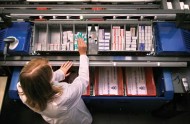 WLN – Your key themes as a business are the universal shuttle and error-free warehouse concepts. Taking the shuttle first, can you talk us through this, and how it transforms customers’ materials handling processes?
WLN – Your key themes as a business are the universal shuttle and error-free warehouse concepts. Taking the shuttle first, can you talk us through this, and how it transforms customers’ materials handling processes?
The universal shuttle concept is based on minimising the number of different technologies used around the warehouse. This has a whole range of benefits including a manageable number of components, high reliability and redundancy, a shorter start-up phase, lower maintenance costs and total system scalability.
WLN – What specific equipment is involved in the universal shuttle?
The bedrock of the shuttle concept is KNAPP’s OSR Shuttle™ system, which combines shuttle-based storage with pick-to-light stations.
WLN – How does it compare with other equipment on the market?
Although there are several similar products on the market today, the shuttle storage concept was invented by KNAPP when the OSR Shuttle™ made its market début back in 2002. Designed for high pick rate, small orders, the system achieves six times the rate of totes in/out than an ASRS, while using less than 10% of the energy consumption. The system also has about 20% less footprint for the same number of locations, compared to an ASRS.
WLN – How many shuttles have you delivered so far?
KNAPP recently delivered its 5000th shuttle from the OSR Shuttle™ range, which now boasts over 100 satisfied customers worldwide. There are also orders in the pipeline for another 2,000 shuttles, including various orders in the UK.
WLN – Can you tell us about any of the customers you have supplied shuttles to?
We are currently working on a major project for Hermes Fulfilment – part of the leading retail and services group, Otto. The order is to install the world’s largest OSR Shuttle™ system, featuring some 176,000 storage locations, in Hermes Fulfilment’s distribution centre in Haldensleben, Germany, with system start-up scheduled for autumn 2010. The OSR Shuttle™ will be the heart of a new automatic returns system, with a storage capacity of approximately 1 million products. Supplying 30 workstations on two levels, the highly dynamic OSR Shuttle™ will process up to 15,000 items per hour at peak times.
 WLN – What solutions do you offer to achieve an error-free warehouse?
WLN – What solutions do you offer to achieve an error-free warehouse?
The error-free warehouse is the other key platform for KNAPP innovation at present. Picking accuracy is universally desired, but is now also becoming a legal requirement, particularly in the pharmaceutical sector. At KNAPP, we are employing a whole host of strategies to work towards the error-free warehouse. While some elements are well documented – such as the Cubiscann measuring system to obtain accurate product data – others are subject to ongoing innovation. For example, advances in picking technology – including our new KiSoft VISION optically guided system – and ergonomics, including the integration of user-friendly materials such as wood and cushioned fascias, are feeding into the error-free warehouse concept.
WLN – Can you talk us through the solutions you have supplied to your UK customers, John Lewis, British Gas, Clarks and The Co-operative Pharmacy?
As mentioned, for John Lewis we installed a £25m automated handling system, with over 8km of conveyor and 250,000 bin storage locations. For Clarks we designed a solution for handling over 40 million pairs of shoes in boxes, annually. One of the major challenges was to adapt our conveyors to the different pack sizes, from 200g to 2.5kg. When Clarks called us in, it was our first large-scale solution in this sector, although we’d been in the shoe market for decades.
The Co-operative Pharmacy invested £16m in Europe’s most technically advanced pharmaceutical handling centre. For British Gas, we equipped their distribution centre handling parts for mobile service technicians. The 12,800 sq m facility handles over 50,000 SKUs and processes 90,000 items per day.
WLN – Purchasing Moving AB and its subsidiaries has strengthened your Scandinavian presence. What specific expertise, new technologies and processes have they brought to the group?
Moving has brought us a different body of expertise: they have extensive experience in pallet handling, storage and robotic palletising, which allows us to integrate these technologies into our solutions where they are suitable. Moving also has the ability to offer customers a one-stop shop for the purchase of conveyor components, via a product catalogue, which is very useful for companies who wish to integrate this equipment into their own solutions.
The Moving operation is now re-branded KNAPP Moving, and they were a key part of the project team for The Co-operative Pharmacy.
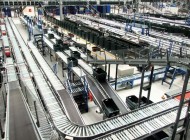 WLN – What is involved in developing a solution for a customer? How long does it take from design to go-live?
WLN – What is involved in developing a solution for a customer? How long does it take from design to go-live?
We start by understanding the customer’s business and their criteria, and defining the KPIs for the project. The client is the expert on his business: together we define the most appropriate solution to hit the KPIs. Voice picking could take a couple of months from design to go live; the John Lewis project took over 12 months from order to handover, while The Co-operative Pharmacy took less.
WLN – How long does it take to see a return on investment for one of your solutions?
For simpler solutions it could be under 12 months, or up to three years for more complex ones.
WLN – How compatible are your solutions with other materials handling equipment?
They’re very compatible. You can make modifications by changing the software. From our point of view, a key element is the control solution, which we can reconfigure, along with elements of the automation. It comes back to focusing on the customer and working with them to help them, so that when their business needs change we can work with them to adapt our solution to provide the best fit.
WLN – Do you work with other integrators to supply them with kit for their solutions?
Yes, we can happily work with other integrators if the client requires.
WLN – You’ve clearly come through the recession in very good shape. What effect if any has the recession had on demand for your solutions?
We had a reasonable 2009: we saw different types of projects carried out, with more modifications to existing applications. People have been sweating their assets and demanding more utilisation, and we worked with them to find small modifications that would allow expansion. We still have a reasonable level of business, which is an achievement, given the market.
WLN – What added-value services do you offer for your customers?
By “added-value services”, we mean service and support. We offer a whole range of services including machine condition audits, leak detection, thermal imaging, vibration analysis, fixed wiring inspection, Health & Safety software and portable appliance testing.
We don’t set out to take over the competition’s service and support business, but if a customer wants to talk to us about their existing kit, we’ll be happy to do so.
WLN – What capacity do you have to take on more resident maintenance contracts?
As previously mentioned, resident maintenance contracts are a definite growth area; we are geared up to do it and it’s an area which is constantly expanding.
WLN – Where do you see KNAPP UK going from here?
We have expansion plans in all the areas we’ve discussed, as part of our global strategy. Our business philosophy is to offer best-in-class order picking solutions and full integration of solutions, especially highly automated ones. We are taking these into new areas with KNAPP Moving as our pallet-handling experts and Dürkopp as our hanging garment specialists.
We will continue to build on our strong foundation in the UK as a global supplier and provide a service to all customers – from a small project or a modification to a highly complex solution – and look for continued growth across the board. We will keep our key focus on working with customers in long-term partnerships.
KNAPP UK Ltd Tel: 01844 202149 Email: sales.uk@knapp.com www.knapp.com




Comments are closed.